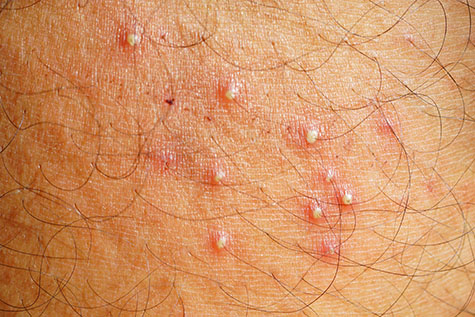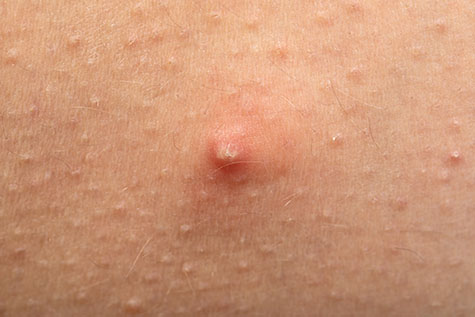What Causes Folliculitis?

Folliculitis is a skin condition in which hair follicles are irritated or inflamed. These irritated follicles can be isolated to only a small area of the body or can be generalized to large body surface areas. There are multiple causes of folliculitis which include:
- Infection (bacterial, fungal, viral, or parasitic)
- Using hot tubs
- Hair removal (shaving, plucking, or waxing)
- Wearing tight clothing
- Topical or oral medication-related side effects
- Weight gain
- Frequently touching or rubbing the skin
- Skin rubbing against skin
Who Gets Folliculitis?
Virtually any patient of any age can get folliculitis. You may be more likely to have folliculitis if you are prone to ingrown hairs or irritation when shaving or otherwise removing hair, if you frequently use hot tubs, or if you are overweight among other factors.
Why Treat Folliculitis?
For many, folliculitis subsides without medical treatment as the immune system naturally fights the infection. However, you may require treatment to address persistent, recurrent, or disabling folliculitis. This condition can be painful or uncomfortable, and you may face difficulty treating it at home if you are unsure whether you have folliculitis or another condition, such as acne.
How Can I Prevent Folliculitis?
It is usually possible to prevent folliculitis by avoiding or modifying the triggers for the condition. For example, you can help prevent folliculitis by:
- Wearing loose clothing, especially when it is humid or while exercising
- Avoiding the use of hot tubs and/or ensuring your hot tub is properly maintained
- Thoroughly washing all clothing, including bathing suits, and allowing them to fully dry before each wear
- Shaving carefully or trying a new hair removal method
How Can I Treat Folliculitis?

At home, for mild cases, you can initially attempt treatment by using a warm compress about 3-4 times daily and avoiding shaving over the affected areas. If the condition persists or worsens, it is important to pursue a professional evaluation by a board-certified dermatologist to determine whether your condition is folliculitis and, if so, what is the specific cause for your folliculitis. Once the cause for your condition is determined, your dermatologist can establish a personalized treatment plan to address your condition and strategies to prevent future recurrence. Some common treatment options include:
- Benzoyl peroxide
- Glycolic acid
- Salicylic acid
- Topical antiseptics and antibiotics
- Oral antibiotics
- Isotretinoin (Accutane)

Schedule an Appointment
If you’re dealing with an acne-like breakout and are unsure whether it is acne or folliculitis, the board-certified dermatologists at Arlington Dermatology can help by making an accurate diagnosis and developing an individualized treatment plan that will be effective for you.
To schedule an appointment at Arlington Dermatology, please call our office or request an appointment online.


